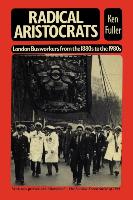- Start
- Radical Aristocrats London Busworkers from the 1880s to the 1980s
Radical Aristocrats London Busworkers from the 1880s to the 1980s
Angebote / Angebote:
Radical Aristocrats was first published in 1985 the London Bus Section of the Transport & General Workers' Union (TGWU) was facing its most challenging period for decades, perhaps ever. Much has happened in the last quarter of a century.
The Greater London Council (GLC) was abolished in 1986, and London Regional Transport (LRT) thereafter reported directly to the Department of Transport. Former GLC leader Ken Livingstone moved across the Thames to the House of Commons, where he sat as a Labour MP. However, due to the fact that the GLC had been able to introduce a variant of the low-fares policy declared unlawful by the Law Lords, bus patronage in London went on increasing year after year, while in the rest of the country it declined.
For London's busworkers, however, the news was not so good. Gradually, the routes operated by LRT subsidiary London Buses Ltd. (LBL) were put out to tender. Inevitably, the early tendered routes were lost to private operators, as LBL's bids were based on current wages and conditions. LBL therefore decided that in future it would bid on lower wages and worse conditions, without consulting the TGWU beforehand. This tactic was first employed at Potters Bar garage, and when LBL succeeded in retaining the routes by this method, the existing workforce was offered a severance package which, being relatively generous, meant that the employer was able to avoid strike action. The union then faced the task of recruiting the replacement staff and integrating them into the London Bus Section.
Fremdlagertitel. Lieferzeit unbestimmt
